Beth Tabler's Blog, page 187
May 26, 2022
Review – PULSE by B.A. Bellec
But Pulse is about so much more than mere carnage and fright because of the prospect of scary monsters ripping the characters apart. It is some of the humans who are the real monsters of the book. This is a novel about unchecked corporate greed, rampant, unrestrained capitalism, dirty politics, mayhem, and murder.
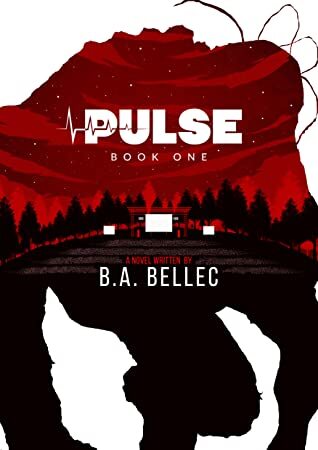 Pulse (Book One in the ‘Pulse‘ series), by B.A. Bellec, was a book I wanted to read so badly that I squeezed it into my month (April 2022) dedicated to reading Indie grimdark fantasy “masters”.
Pulse (Book One in the ‘Pulse‘ series), by B.A. Bellec, was a book I wanted to read so badly that I squeezed it into my month (April 2022) dedicated to reading Indie grimdark fantasy “masters”.
No, this book is not grimdark fantasy – instead it is a dystopian sci-fi horror thriller. The reason I wanted to read this book so badly is that, as I seem to be becoming more and more of a mood reader, a lot of current world events had me craving to read something that – based on the blurb – would encapsulate a lot of the issues in the world we are grappling with, in the digestible, non-real format of engaging fiction. Plus, I am beginning to be able to appreciate horror books again, so Pulse seemed the ideal read.
The book comes with a TON of accolades, among them: B.R.A.G. Medallion Honoree, Wishing Shelf Adult Fiction Finalist, Literary Titan Seal, Reader Views Seal, Readers’ Favorite Seal. So, with all these awards, I was expecting, at a minimum, a well-written book.
What I WAS NOT expecting, and what I was not prepared for, was the screenplay-like writing format. At first, to be honest, it took a bit of getting used to. But soon, I was so engrossed in the story, the way it was formatted no longer mattered.
But I put this fact about the writing style out there first for those who would not enjoy that sort of arrangement. If you can’t mesh with that, this book may not be for you. But I would encourage you to give it a try, because the book itself I found to be exceptional.
What is Pulse about? At its foundation, Pulse is a horror book, and a downright scary one. It has the five key elements that mark every great horror book that I have ever read: 1)characters who could die any moment, regardless of their seeming importance to the plot or how beloved they are (so no one is safe, thus increasing the tension and suspense) 2)the element of utter and complete surprise when something horrible happens 3)Immensely terrifying monsters or menaces.
But Pulse is about so much more than mere carnage and fright because of the prospect of scary monsters ripping the characters apart. It is some of the humans who are the real monsters of the book. This is a novel about unchecked corporate greed, rampant, unrestrained capitalism, dirty politics, mayhem, and murder.
The titular Pulse company essentially has a monopoly on EVERYTHING in the year 2040, and is run by completely amoral executives, with a despotic father and slimy, selfish son at its head. Moreover, the company is tied to the highest levels of political influence, and essentially is the puppet master behind the most powerful of world governments.
Woe for humanity, for Pulse owners and execs cares naught for the utter destruction of the environment, human health, or morality, as long as it increases its global dominance, profit margins, and ascendancy. Additionally, Pulse eliminates competition in utterly ruthless fashion, where killing off competitors is just the floor for how far they are willing to go.
In this backdrop, Pulse plans an iconic music festival, as large in scale and scope as has ever been seen, reminiscent of the famous Woodstock. Yet unbeknownst to the Pulse planners, the festival appears doomed. First, an anti-corporation revolutionary group is planning to disrupt the festival, in an attempt to destabilize it, and rid the world of Pulse’s insidious control of society. Second, other anti-Pulse forces are working behind the scenes, for their own purposes.
And most importantly, third, seemingly born of the ecological havoc that Pulse has wreaked, a hideous creature is hunting humankind, and it’s hungry.
The sci-fi elements are extremely well-done in Pulse. The tech element I especially found fascinating was the drone robot, the P-7500, which had become for the average human an indispensable personal assistant. On the other hand, this robot is also used for protection and aggression in the wrong hands.
In terms of the dystopian aspect, the effect of climate change, pandemics, and corporate monopolies exerting undue sway over our lives, was depicted in chillingly prescient fashion.
For me, my only wish was for more exploration of the immense cast of characters that fill the pages of Pulse, because as those who read my reviews know I’m all about the characters. To the positive, there are some marvellous characters in Pulse – I just wanted to know a lot more about them.
But Bellec’s incredibly fast-paced plot does not leave as much room for additional exposition and backstory exploration. It’s also part of, I believe, the author’s plan, to reveal a lot more about some key characters (the few who end up surviving the first installment) in future books. There is a lot of mystery and intrigue surrounding two characters in particular: who and what they really are, and what the limits of their capabilities are. I can’t wait to find out more about them in future books.
To be clear, we have a large set of villains, heroes, and those whose motivations we are completely unsure of. There are multiple POVs, and at first, it’s a lot to keep pace with, but as the story unfolds, it all becomes easier to follow.
The completely gruesome and appealing monsters will send chills down your spine, the plight of those facing them will make you terrified for them, and rest assured there will be gore splattering the pages. The shadowy figures, corporate assassins, those possessed of unique and undecipherable abilities, brave whistle-blowers and activists, law enforcement officials, completely unethical businessmen, make for a diversified and intriguing group of perspectives.
The pace is breakneck, and heart-pounding. Your skin will crawl at some of the imagery regarding the creatures, you will sweat with the built-up tension, and you will be completely unable to extricate yourself from the compulsive narrative. If you want a plot-focused book that will keep you up at night, not only because it’s so good, but because it will creep you out, this is your book.
Bellec is a freakishly talented writer, who fans of horror, sci-fi, and thrillers should definitely put on their radar, and Pulse was a great read! 4.75 stars!
Purchase PULSE by B.A. BellecReview of Paper Girls, Vol. 1 by Brian K. Vaughan, Cliff Chiang
REVIEW – A TIME OF COURAGE – JOHN GWYNNE
The post Review – PULSE by B.A. Bellec appeared first on BEFOREWEGOBLOG.
Review – Mickey7 by Edward Ashton
Mickey7 by Edward Ashton was a novel that was not too dense but explored future ideas with enough gravitas to get me thinking, but not enough to bog me down. Mickey7 wasn’t full of Earth and perspective-shattering ideas, but damn, it was a fun way to spend an afternoon or two.
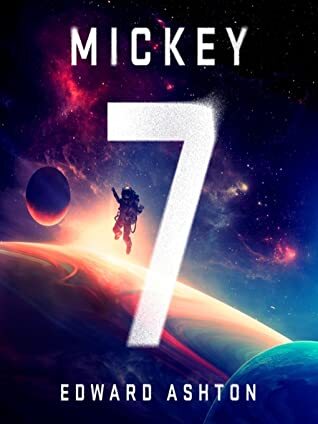 The premise starts with Mickey Barnes, the titular Mickey7. He is the seventh iteration of himself—a clone of a clone, and so on. “Mickey7 is an Expendable: a disposable employee on a human expedition sent to colonize the ice world Niflheim. Whenever there’s a mission that’s too dangerous—even suicidal—the crew turns to Mickey. After one iteration dies, a new body is regenerated with most of his memories intact.” Do you need someone to take a fatal dose of radiation, try out an experimental vaccine, or introduce themselves to a non-friendly planet entity? Mickey is your guy. That is why he gets paid the big bucks… errm. That is why he gets all the food! Wait, that isn’t it either…Moving on.
The premise starts with Mickey Barnes, the titular Mickey7. He is the seventh iteration of himself—a clone of a clone, and so on. “Mickey7 is an Expendable: a disposable employee on a human expedition sent to colonize the ice world Niflheim. Whenever there’s a mission that’s too dangerous—even suicidal—the crew turns to Mickey. After one iteration dies, a new body is regenerated with most of his memories intact.” Do you need someone to take a fatal dose of radiation, try out an experimental vaccine, or introduce themselves to a non-friendly planet entity? Mickey is your guy. That is why he gets paid the big bucks… errm. That is why he gets all the food! Wait, that isn’t it either…Moving on.
Mickey7, having dealt with six violent or gruesome deaths, has a better idea of what death is than anyone else in his colony. Furthermore, because humans have different views of death, many in his colony shun him or want to sleep with him. It makes for odd working conditions for him. He is either reviled or secretly worshipped, and not a whole lot in between.
While out on a scouting mission with his best friend, Mickey takes a tumble into a ravine through pure bad luck. It would be difficult to get him out, his friend tells him to open a vein and he would see him soon. Mickey is truly touched by the care that his friend is showing him in what could be his final moments. But Mickey stumbles along, for once refusing to die, and makes it back to the base colony. However, Mickey8 had already been created and had all his memories downloaded into his skull.
The colony and society have rules regarding the number of clones in existence, 1. It is also very biologically expensive to create new humans. It takes a lot of potential calories to create muscles and bones. On the colony calories equal currency. When Mickey7 meets Mickey8, they decide that neither would like to die, and they will work together. But this leads to a mountain of philosophical and practical problems. The story repeatedly asks, if we are not our bodies, are we still us? It is not new territory, any clone story has to eventually ask this question. But I like that in Mickey7, it is asked subtly. Mickey7 does not ponder life’s meaning while staring into the yonder, he is too busy working and trying to stay alive another day. But the undercurrent of that idea is there.
The Mickeys work to keep themselves out of the recycler. The recycler is where anything biological is thrown to melt down and recycle to be used again in some capacity. A threat that is hanging over their heads like the sword of Damocles. But, staying out of the recycler is the least of Mickey’s issues. They are not the only creatures on this planet, and things are about to get way more interesting for this couple of clones.
Mickey7 is a super fun book to read; there isn’t a lot of development. The period it takes for the story to take place is relatively short and thus doesn’t allow for any solid growth for Mickey. The story is more of the Mickey’s escaping one problem to throw themselves into another, very much like a kamikaze pigeon bouncing against cars on the freeway. But the way that Mickey is written is rather charming. He is a rather affable fellow who loves history, his girlfriend is written as someone who loves him despite his neurosis and his best friend is a chump. But not enough of a chump to be the antagonist of the story. Mickey is just a normal dude, thrust into unique circumstances time and time again.
I would certainly recommend this to those looking for some light science fiction. The idea of an expendable was enough to cinch it for me. Check it out.
Read Mickey7 by Edward AshtonThe post Review – Mickey7 by Edward Ashton appeared first on BEFOREWEGOBLOG.
Review – Tales from Outer Suburbia by Shaun Tan
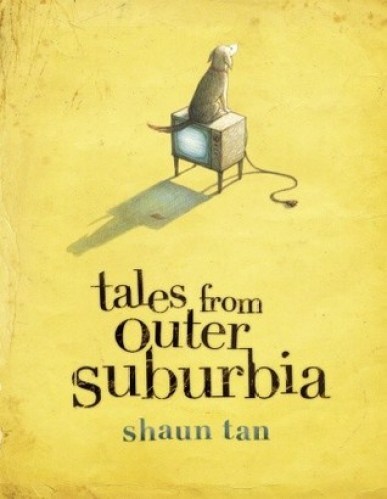
About
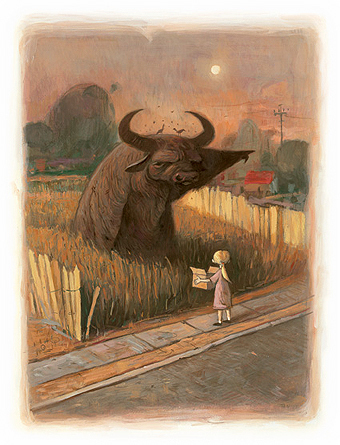
‘water buffaloes are like that; they hate talking.’
From the publisher, “Breathtakingly illustrated and hauntingly written, Tales from Outer Suburbia is by turns hilarious and poignant, perceptive and goofy. Through a series of captivating and sophisticated illustrated stories, Tan explores the precious strangeness of our existence. He gives us a portrait of modern suburban existence filtered through a wickedly Monty Pythonesque lens. Whether it’s discovering that the world really does stop at the end of the city’s map book, or a family’s lesson in tolerance through an alien cultural exchange student, Tan’s deft, sweet social satire brings us face-to-face with the humor and absurdity of modern life.”
My Thoughts
‘He was saying the same sentence over and over, ending with “tasoo-ke-te, tasoo ke-te.”‘
This review may come off as a bit biased because I love “The Arrival.” Honestly, it isn’t so much as an “apple to oranges” kind of comparison between the two books, but maybe a comparison of two of the most glorious pieces of fruit one can eat. Each is wonderful in its own way.
Both of these novels are excellent, but they are different in a slight, albeit essential way. There are words in “Tales From Outer Suburbia”… The experience of Shaun Tan’s illustrations is a bit more on the nose.
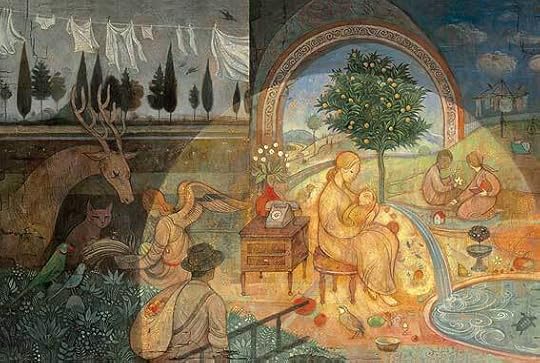
‘It opened into another room altogether… an impossible room somewhere between the others.’
“Tales From Outer Suburbia” is a collection of fifteen nuanced short stories. All are threaded together with an exploration of the vapidness, bewilderment, joy, sorrow, and enlightenment of living in the suburbs; specifically the suburbs of eastern Australia. Each of the stories is captivating and a hell of a lot deeper than the two or three pages devoted to each. For example “Stick Figures,” is a story about wooden stick figures that are part of a suburban landscape. They move unimaginably slowly, and their purpose is not precisely known. However, if you think about suburbia and the little bits of nature that come through the manicured lawns and the shopping malls, nature could very much seem like an unknowable creature that exists, but we have no idea the purpose. As someone who has spent much of their life living in the suburbs and had to travel to visit nature, I get what he is trying to say. Nature can become unknowable.

‘How great it must have been long ago, when the world was still unknown.’
Another glorious story was “No Other Country.” This story explores what it means to be a person of two ideals. The unexplored model of what a place should be as one ideal and the current situation you live in as the other.
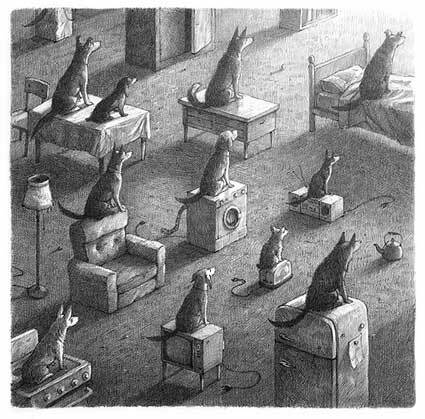
‘The fire burned with astonishing intensity.’
What if you could escape to the ideal place at your leisure? Would that change how you felt about your current living situation? Again this taps into a lot of what Shaun Tan writes about in “The Arrival.” The idealized world and the reality. Would you appreciate your reality if you could escape it once in a while? It is a powerful short story, and absolutely worth the read.
I feel like reading a Shaun Tan book is meditative. They are never boring, beautifully written, and gorgeously illustrated. However, his work is saturated with calmness and purposefulness. His words and images are impactful without being jarring. You don’t see that often in any type of literary work. It speaks to mastery of craft that I feel privileged to partake in as a reader. As you can probably tell, I am a fan and recommend his work. However, it isn’t for everyone. It is fanciful and calm and deep. Sometimes, that is not what one needs in their books. So my suggestion is that if you are feeling self-reflective or full of ennui, give one of his novels a try. I doubt that you would regret the experience.
Buy Tales From Outer SuburbiaGraphic Novel Review of – The Arrival – by Shaun Tan
The post Review – Tales from Outer Suburbia by Shaun Tan appeared first on BEFOREWEGOBLOG.
May 25, 2022
Review – PICARD: ROGUE ELEMENTS by John Jackson Miller
PICARD: ROGUE ELEMENTS is just plain fun. I am a huge John Jackson Miller fan from the days when he was writing the KNIGHTS OF THE OLD REPUBLIC comic book. He is a writer that manages to carefully walk the balance beam between high comedy and aggressively serious depressing moments. I have yet to read something by him I didn’t like and was compelled to pick up this book to read what he was doing with the Picard timeline.
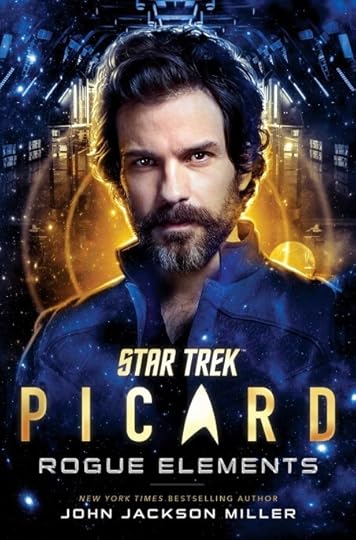 I’m a huge Picard fan but I can’t say that Cristobal Rios was my favorite character of the series. I felt he was just too similar to so many other tramp freighter captains I’ve seen over the course of my decades of science fiction fandom. JJM smartly plays into this with the fact that the story has Raffi Musiker arrange for him to become one while ignoring the fact that Rios doesn’t want to be. He doesn’t find it to be a romantic, exciting, or entertaining pulpy adventure as seemingly everyone else does. It makes a nice difference from Han Solo and Malcolm Reynolds even as the story does become a romantic exciting entertaining adventure.
I’m a huge Picard fan but I can’t say that Cristobal Rios was my favorite character of the series. I felt he was just too similar to so many other tramp freighter captains I’ve seen over the course of my decades of science fiction fandom. JJM smartly plays into this with the fact that the story has Raffi Musiker arrange for him to become one while ignoring the fact that Rios doesn’t want to be. He doesn’t find it to be a romantic, exciting, or entertaining pulpy adventure as seemingly everyone else does. It makes a nice difference from Han Solo and Malcolm Reynolds even as the story does become a romantic exciting entertaining adventure.
The premise is that Rios has just been kicked out of Starfleet for the crimes of his supervisor and he’s lost all of his friends but one. Raffi decides to set him up with a tramp freighter and the life of a Han Solo-esque rogue but this proves to be significantly less glamorous than the movies show. I also got a huge kick out of finding out that JJM was going to make extensive use of the Iotians from “A Piece of the Action” with them being Rios’ version of Jabba the Hutt. Still gangsters after a century of contact with the Federation, they are both ridiculous as well as very good at thriving in a galaxy that has largely forgotten how to deal with criminals.
Part of the book’s fun is how miserable Rios is dealing with the loss of his Starfleet career, how disordered life is on a tramp freighter, and how angry he is about Starfleet’s betrayal vs. the fact that he is going on a series of increasingly wild treasure hunts. Rios is a terrible businessman, fitting from an Earth Hu-Mon (to quote the Ferengi) and probably would have just given away his ship in a weak if not for new character, Ledger, forcing him to pay a debt that is obviously meant to never be repaid.
JJM’s experience in Star Wars clearly shows as he makes the transition a bit better than other writers might. It reminds me of the old Brian Daley Han Solo novels that I felt were the best of the Star Wars Expanded Universe. JJM envisions a seedy underbelly for the galaxy that has always been there (Harry Mudd anyone?) but has never been given particularly much attention. I also appreciated the return of a TNG villain that was underused too and won’t spoil the surprise of. I will say it was kind of amusing to note that this book brought them back just as they used as an inspiration for Lower Decks too.
While I rarely comment on this element, I also give the book’s handling of romance props. Rios is a very dashing protagonist who manages to handle relationships with no less than three women in the book but somehow doesn’t come off as skeezy over it. I also appreciated that one of them is with a significantly older woman and it’s not treated as the least bit weird. I actually regretted that at least one couldn’t continue because, of course, he’s alone at the start of Star Trek: Picard. I also regret we’ll likely never see any more of the Klingon merchant lord Verengar–unless we get a sequel series to this!
So, top marks and people should really buy this! Some of the funniest most entertaining Star Trek fiction I’ve read in years and I’ve read over a hundred Star Trek novels. Hell, probably closer to two hundred. I have maybe a few minor complaints that are almost insignificant to mention like some of the goons getting away with their crimes when I felt a more final fate would have been better but forget it, Rios, it’s Iotia. It’s still a very solid and fun book that makes me like the Rios character a lot more.
Read Rogue Elements by John Jackson MillerThe post Review – PICARD: ROGUE ELEMENTS by John Jackson Miller appeared first on BEFOREWEGOBLOG.
Review – PICARD: THE DARK VEIL by James Swallow
PICARD: THE DARK VEIL is a great Riker and Troi story. I am a big defender of the STAR TREK: DISCOVERY, PICARD, and LOWER DECKS series. However, if I had to choose between them then I’d probably say that Picard is my favorite of the three. It has the most interesting premise and ideas to develop. Indeed, my biggest issue is that I felt the first season was far too compact and that it needed another few episodes to detail all the various concepts it was dealing with.
 I was a big fan of THE LAST BEST HOPE and felt it really could have been the basis for those extra episodes. Una McCormack took the time to expand and explain the political situation and build-up in a way that helped the story breathe. I was wondering if something similar could be done with THE DARK VEIL as James Swallow (who I mostly know from his Star Trek: Titan novels) follows the U.S.S Titan into the events of Picard.
I was a big fan of THE LAST BEST HOPE and felt it really could have been the basis for those extra episodes. Una McCormack took the time to expand and explain the political situation and build-up in a way that helped the story breathe. I was wondering if something similar could be done with THE DARK VEIL as James Swallow (who I mostly know from his Star Trek: Titan novels) follows the U.S.S Titan into the events of Picard.
The premise of this book is that the U.S.S Titan with Captain Riker and Counselor Troi are dealing with the fact a Federation ally, the Jazari, are suddenly leaving the Alpha Quadrant in a generation ship. Something has horribly spooked them and the Federation is left clueless. This is also just a year after the horrific Mars attacks, Synth Ban, and failure to evacuate the Romulan homeworld. After a space disaster leads to the Titan rescuing the Jazari ship, an unexpected alliance occurs between them and a Romulan warbird. Everything promptly goes to hell afterward.
The Dark Veil feels like a combination of the Titan novels and the Picard era, which is an interesting fusion that I would be interested in seeing more of. Certainly, novel character Christine Vale shows up and I’ve always supported her in more properties. I’m still hoping she’ll be canonized by Lower Decks. Really, it feels like a mixture in ways both subtle as well as overt. The Jazari are the kind of species that feel very much like a Titan creation. They are alien and “big” in a way that novels can do in ways that television can’t (or is very hard pressed to) as well as alluding to past history that the shows rarely do these days. I figured out their secret fairly early and it’s a bit on the nose but Star Trek has rarely needed to be subtle about it’s themes. Arguably, Picard could have done more with its themes like this.
I also appreciate the use of the Romulans in this book as we get a nice mixture of “honorable soldier”, “sneaky KGB Loyalty officer”, and “insane death cultist.” Some people had issues with the Zhat Vash when it was introduced in Picard but seeing how the Admonition utterly breaks someone’s mind like a Lovecraftian Cthulhu cultist actually helps underscore what the show only hinted at. The Romulans are a race that lost a lot of menace with their transition to The Next Generation, being supplanted by the Cardassians, and I feel this book does a good job of restoring how terrifying they were supposed to be.
The book also effectively uses foreshadowing and canon to hang an ominous cloud over all of its events. Thaddeus Riker is an adorable child that we know for a fact is not going to reach adulthood. The fact the Romulan system has about a year left before 900 million residents die is also something that hangs over the heads of each of its residents. Using that helps elevate the material as we know there’s no good ending to all this. The fact the Jazari choose to make the decision they do also underscores just how badly the Federation has screwed up. Even if banning synth research is something you’re doing because you’re afraid of making slaves, some races are going to take it personal.
In conclusion, this is a good Star Trek novel and would be appreciated by both U.S.S. Titan as well as Picard fans. I preferred The Last Best Hope but that was more due to the fact that it got heavier into the politics of the event. This is a more pulpy space opera adventure that I also like but not quite as much.
Read Picard: The Dark Veil by James SwallowThe post Review – PICARD: THE DARK VEIL by James Swallow appeared first on BEFOREWEGOBLOG.
Graphic Novel Review – Criminal Vol. 1 (Coward) by Ed Brubaker

Just empty regret and bitter heartbreak, wandering the streets.
The city around him, white and grey and cold, felt suddenly so small.
Hyde had been right about family, there was no escaping it…
Even when there was no one left to run from.”
― Ed Brubaker, Criminal, Vol. 2: Lawless
AboutMy ThoughtsFrom Harvey Award-Winning Best Writer Ed Brubaker, and Scream Award-Winning Best Artist Sean Phillips comes the first collection of Criminal, one of the best reviewed comics of 2006. Coward is the story of Leo, a professional pickpocket who is also a legendary heist-planner and thief. But there’s a catch with Leo, he won’t work any job that he doesn’t call all the shots on, he won’t allow guns, and the minute things turn south, he’s looking for any exit that won’t land him in prison. But when he’s lured into a risky heist, all his rules go out the window, and he ends up on the run from the cops and the bad men who double-crossed him. Now Leo must come face-to-face with the violence he’s kept bottled up inside for 20 years, and nothing will ever be the same for him again. Collects Criminal #1-5.
 There are some things you need to know before starting this series:
There are some things you need to know before starting this series:
Knowing all this if you want to continue into this world, it is quite a ride. The premise revolves around the protagonist, Leo Patterson. A former heist strategist who has left the life of crime to take care of Ivan, an old family friend. Ivan is addicted to heroin and has Alzheimer’s. At Ivan’s age, breaking heroin addiction becomes untenable so Leo provides palliative care to Ivan. Leo agrees to the heist against his better Judgement, swayed by an attraction to recovering heroin addict Greta. From there, the story progresses through a series of backstabbing and double-crossing that leave various people dead.
The title of the book is coward. This is ironic because Leo is anything but. His cautiousness and reservedness at the beginning of the story lead other criminals into thinking that he is weak, “he doesn’t just walk away from trouble, he runs.” What people don’t understand, and the reader soon finds out is that caution does not necessarily mean forceless. It could mean that you are thoughtful and very, very smart. Like in the case of Leo. He is pushed to the breaking point and becomes a force of nature abandoning all pretense of cowardness and serving up a side of badass on his betrayers. The bold and brazen end up dead or in jail while the cautious and calculating walk away with the money.
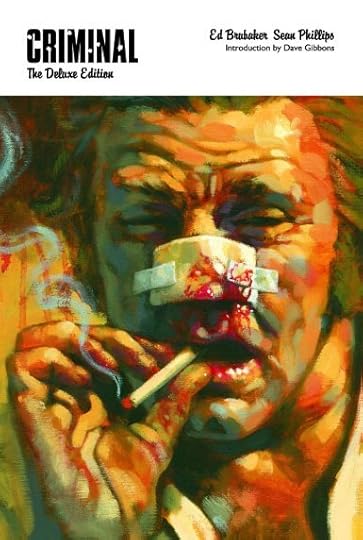 Brubaker is the king of crime noir in graphic novels. A genre much changed since the 1950s. In Criminal Vol. 1, Brubaker sticks to familiar themes, but he serves them up bruised, foreboding, and dark. Although “Coward” could be a standalone series, minor characters in this arc play much larger roles in other character arcs. It is really fun to dissect the minor details of the story when you go back and flip through. Pay attention because there are many offhanded comments in this story that play a larger part in others. This is just good storytelling plain and simple. The dialog, story, and graphics are top notch and it is absolutely worth the journey of discovery. I look forward to checking out the next story arc in “Lawless.”
Brubaker is the king of crime noir in graphic novels. A genre much changed since the 1950s. In Criminal Vol. 1, Brubaker sticks to familiar themes, but he serves them up bruised, foreboding, and dark. Although “Coward” could be a standalone series, minor characters in this arc play much larger roles in other character arcs. It is really fun to dissect the minor details of the story when you go back and flip through. Pay attention because there are many offhanded comments in this story that play a larger part in others. This is just good storytelling plain and simple. The dialog, story, and graphics are top notch and it is absolutely worth the journey of discovery. I look forward to checking out the next story arc in “Lawless.”
Read Criminal Vol. 1 (Coward) by Ed Brubaker
Review of Paper Girls, Vol. 1 by Brian K. Vaughan, Cliff Chiang
REVIEW – THE SHADOW OF THE GODS BY JOHN GWYNNE
The post Graphic Novel Review – Criminal Vol. 1 (Coward) by Ed Brubaker appeared first on BEFOREWEGOBLOG.
May 24, 2022
Review – The Ballad of Black Tom by Victor LaValle
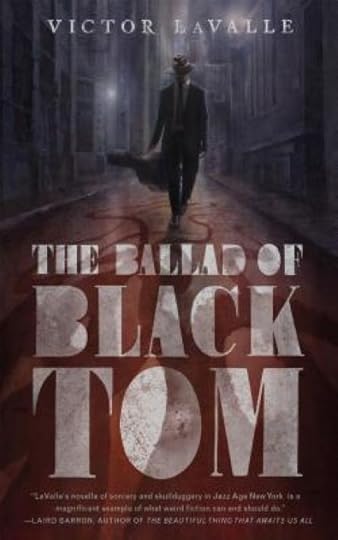
About The Ballad of Black Tom
From the publisher, “People move to New York looking for magic and nothing will convince them it isn’t there.
Charles Thomas Tester hustles to put food on the table, keep the roof over his father’s head, from Harlem to Flushing Meadows to Red Hook. He knows what magic a suit can cast, the invisibility a guitar case can provide, and the curse written on his skin that attracts the eye of wealthy white folks and their cops. But when he delivers an occult tome to a reclusive sorceress in the heart of Queens, Tom opens a door to a deeper realm of magic and earns the attention of things best left sleeping.
A storm that might swallow the world is building in Brooklyn. Will Black Tom live to see it break?”
My Thoughts
The Ballad of Black Tom is the reimagining of the Lovecraftian tale, “The Horror at Red Hook” and is one of those rare books that can straddle the dividing line of fiction and urban fantasy. It is a book of many hats.
The story is one of a street hustler named Charles Thomas Tester of Harlem in the 1920s. Charles, who goes by Tommy, makes his way as best as he can by a variety of hustling gigs. Whether it’s as a Delivery man or guitarist, Tommy does pretty much anything to make some money. Along with the hustles are the obvious and not-so-apparent undercurrents of racism present in 1920s Harlem. Tommy is an African-American man and deals with Racism and prejudice on all sides. The writing about the racism of that era is poignant and well done. Tommy gets involved with some occult figures throughout the story, and different types of tragedy ensue. He begins to take matters into his own hands, and the story ends on a cliffhanger.
From what I understand, the original story “The Horror at Red Hook” was stunningly racist as was Lovecraft as a person. It makes sense why LaValle would respond to that story from the angle of an African-American Protagonist. I think it is fitting and I love seeing the story turned on its head this way. That being said, as I have not read “The Horror of Red Hook,” this was a blind read. I was familiar with the writer and the story’s status as a Hugo award nominee which guided me in selecting it to read, but that’s it.
I have got to tell you overall I was not impressed. I found LaValle’s writing to be excellent. He has a way with his sentences’ structure and the imagery that evokes strong mental pictures. Plus, the plot as an idea is enjoyable. However, the pacing of the story was slow. This was at direct odds with the imagery, and cool plot. That might be because I am unfamiliar with the original Lovecraft story and style, or I just was not in the right mind frame to read it. Either way, I am not the right reader for this story.
Read The Ballad of Black Tim
Review – STARSHIP FOR SALE by M.R. Forbes
Review – Illborn by Daniel T. Jackson
The post Review – The Ballad of Black Tom by Victor LaValle appeared first on BEFOREWEGOBLOG.
First Chapter, First Paragraph – The Deep By Rivers Solomon, Daveed Diggs, William Hutson and Jonathan Snipes
“What is belonging?” we ask. She says, “Where loneliness ends.”What is The Deep ABout?
 The water-breathing descendants of African slave women tossed overboard have built their own underwater society—and must reclaim the memories of their past to shape their future in this brilliantly imaginative novella inspired by the Hugo Award nominated song “The Deep” from Daveed Diggs’ rap group Clipping.
The water-breathing descendants of African slave women tossed overboard have built their own underwater society—and must reclaim the memories of their past to shape their future in this brilliantly imaginative novella inspired by the Hugo Award nominated song “The Deep” from Daveed Diggs’ rap group Clipping.
Yetu holds the memories for her people—water-dwelling descendants of pregnant African slave women thrown overboard by slave owners—who live idyllic lives in the deep. Their past, too traumatic to be remembered regularly, is forgotten by everyone, save one—the historian. This demanding role has been bestowed on Yetu.
Yetu remembers for everyone, and the memories, painful and wonderful, traumatic and terrible and miraculous, are destroying her. And so, she flees to the surface, escaping the memories, the expectations, and the responsibilities—and discovers a world her people left behind long ago.
Yetu will learn more than she ever expected to about her own past—and about the future of her people. If they are all to survive, they’ll need to reclaim the memories, reclaim their identity—and own who they really are.
Inspired by a song produced by the rap group Clipping for the This American Life episode “We Are In The Future,” The Deep is vividly original and uniquely affecting.
First Chapter, First Paragraph
“IT WAS LIKE DREAMING,” SAID Yetu, throat raw. She’d been weeping for days, lost in a remembering of one of the first wajinru.
“Then wake up,” Amaba said, “and wake up now. What kind of dream makes someone lurk in shark-dense waters, leaking blood like a fool? If I had not come for you, if I had not found you in time…” Amaba shook her head, black water sloshing over her face. “Do you wish for death? Is that why you do this? You are grown now. Have been grown. You must put those childish whims behind you.” Amaba waved her front fins forcefully as she lectured her daughter, the movements troubling the otherwise placid water.
“I do not wish for death,” said Yetu, resolute despite the quiet of her worn voice.
“Then what? What else would make you do something so foolish?” Amaba asked, her fins a bevy of movement.
Yetu strained to feel Amaba’s words over the chorus of ripples, her skin drawn away from the delicate waves of speech and toward the short, powerful pulses brought on by her amaba’s gesticulations.
Read The Deep
The post First Chapter, First Paragraph – The Deep By Rivers Solomon, Daveed Diggs, William Hutson and Jonathan Snipes appeared first on BEFOREWEGOBLOG.
May 23, 2022
Review – Conqueror’s Blood by Zamil Akhtar
Conqueror’s Blood is the second book in the Gunmetal Gods series, and the follow-up to the outstanding Gunmetal Gods, which is Book One. Gunmetal Gods is one of the first books I read in 2022 and still firmly sitting in the top five books I’ve read so far this year.
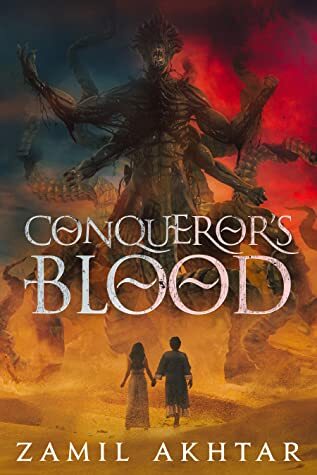 So you can imagine how jazzed I was to get my hands on the sequel. While it was completely NOT what I was expecting, author Zamil Akhtar has somehow managed to outdo himself with this second book in the series, which is no easy accomplishment.
So you can imagine how jazzed I was to get my hands on the sequel. While it was completely NOT what I was expecting, author Zamil Akhtar has somehow managed to outdo himself with this second book in the series, which is no easy accomplishment.
To be clear, Conqueror’s Blood feels not so much like a sequel, but a completely new entry, in a different part of the sprawling, lush, incredible Middle-Eastern inspired world that Akhtar has created. While some key characters from “Gunmetal Gods” show up, and have significant impacts on the story, they more or less are cameos appearances of some of my favs from that first book, including Kevah (protagonist from Gunmetal Gods), and another major character who readers thought was done for, and whose appearance shocked the hell outta me!
Other big names from Gunmetal Gods, such as Micah the Metal, Murad, and others are referred to in “Conqueror’s Blood”, and Akhtar cleverly inserts them on the lips of others in this new book, to only add to their legend, and backstory.
“‘I don’t recall the details of the fight, but it was over rather quickly…for some reason instead of finishing me off, he simply backed away and returned to the line while his army cheered his name – Murad! Murad!'”
But Conqueror’s Blood is not about the Sirmian Shah (one of my favs), or other great male characters, though there are plenty to choose from, with incredible new (old) ones like Hadrith, Kato, Eshe, Pashang, Kevah, Cihan, Kyars, Mansur, Khizir Khaz, and more gracing the pages. No, this novel is all about the astounding women, and the main characters of Conqueror’s Blood, Cyra and Zedra, are extremely complicated, messy, ambitious, obsessed, beautiful, dangerous, and utterly enthralling.
Politics, fanaticism, poetry, possession, power plays, blood magic, and hellish gods using mortals as bait, waiting to pounce on each other are afoot, and the kingdom of Alanya is the centre of all that. Steering all those elements are the two powerful female leads.
Cyra is a Sylgiz (an Endless Waste tribe) by birth, and royalty (albeit it minor) in exile, as the daughter of Khagan Yamar. But she has spent adulthood as a favourite – as close as a daughter – of Shah Tamaz of Alanya. Tamaz is a clever, long-reigning, pious, and mostly benevolent ruling monarch. Cyra’s estranged brother Cihan is now the powerful warlord of her old tribe.
Cihan wants his sister back in the fold. He also wants revenge on Cyra’s new people of Alanya. Cihan believes that Tamaz has wrongfully executed some of Cihan’s men. Cihan is ready to wage war on Alanya, for this cause alone, and also to feed his own ambitions.
Though due to her familial relationship, Cyra is sent to treat with Cihan on Tamaz’ behalf, Cyra has no intention of rejoining her real family and being a minor noblewoman among nomads in the Endless Wastes. She wants power and prestige, and the opulence of Alanya’s Sand Castle and its court. The upstart Cyra aspires as high as the wife of the future Shah.
But Cyra hides lots of secrets that could compromise her plans. Among them, due to searching for love in all the wrong places, boredom, desperation, and a desire to be useful, has driven her to become entangled in the plots of the scheming Hadrith, her paramour.
Hadrith’s causes might seem outwardly just in the end, but he also might be using Cyra to destabilize Alanya, to increase his own gain. The consequences of his schemes could harm all Cyra holds dear.
Meanwhile Zedra, as well, is favoured by Tamaz, and like another daughter to him. Little more in actuality that a concubine to Tamaz’s heir, Kyars, Zedra has borne Kyars a son, and the potential future Shah of Alanya.
As the mother of the Crown Prince’s child, and being beloved of Tamaz, Zedra wields some measure of influence, like her best friend Cyra, in Alanya. But Zedra is keeping far darker secrets than Cyra. For an ancient sorceress, tied to those who worship Father Chisti – called the Children – lurks inside the body of Zedra. A shapeshifting being, obsessed with restoring the faith of the Children, and in the process, potentially destroying the world.
For me, of course, the most important thing about a book is always the characters. I loved what Akhtar did with Conqueror’s Blood, following a similar format in Gunmetal Gods, where we alternate POVs between two people who are on opposite sides. This time, the two female leads are close friends, and it is only as things unravel we see how diametrically opposed they are.
Even if one character is obviously more sinister than the other, that other character is highly flawed, makes horrible decisions, and does bad things. Cyra is tortured by what she does to find comfort, and guilty over whose arms she find comfort in. But she is exceptionally cunning, brave, and fundamentally, a good person at her core.
Consequently, the “bad” main character, Zedra, also internally feels remorse for her crimes, and might even evoke sympathy from the reader, as we gain insight and understanding into why she is the way she is. Powerless to escape her long history of brutality, both that she has committed, and what has been enacted against her family, all in the name of religion and the gods, Zedra was my favourite character of this book. So compelling, sometimes so sinister, and yet so vulnerable, I was drawn to this main player, to see if there was any redemption possible for her.
Moreover, the secondary characters are all highly grey, with murky motivations, continually shifting loyalties, willing to do the worst to further their aims. And, with varying factions within factions, the reader’s emotions will roller-coaster as they change sides too, uncertain of who truly to root for in terms of who deserves to ultimately emerge victorious, as Akhtar pulls us along like puppets on a string, through a bloody trail of deceit, siege, and primeval gods.
As with Gunmetal Gods, Akhtar is on the top of his game in terms of the mind-boggling world building, in Conqueror’s Blood. He makes me want to take a stroll through the streets of Alanya, soaking in the poetry in Laughter Square, eat a bowl of tamarind sherbet, and inhale all the spices. The world is so layered, beautifully textured, replete with different customs, cultures, faiths, languages, attire, idiosyncrasies, literature, and everything else that makes it feel completely real.
We get so many amazing and interesting themes in this novel, but again, the heart of it is religion and faith. We see and hear more of the gods, and the main one who dominates the last quarter of the book is about as despicable as they come. The scarier thing is that he might not be the MOST despicable of what IS coming.
And we see mortals (and sort-of-mortals) completely not only at the mercy of the capricious gods’ ambitions, but also paralyzed by their own faith, their prejudices against the faiths of others, and driven to terrible, inhumane acts by zealotry. The end always seems to justify the means, in the mind’s of the faithful, and by the time there is any real kind of self-reflection, and examining of what one is willing to do for one’s gods, and if those gods are worth all the horror, it’s usually far too late.
Akhtar may have created an intellectual, sophisticated world where poetry is appreciated, even revered, but I find much of his writing to be poetry itself. I keep finding myself re-reading passages, for the beauty of the words. I attach one of my favourites below:
“Did she want me to say sorry? Sorry I destroyed your life…I wished I’d never done it, but I couldn’t hold that remorse. True remorse requires repentance, and true repentance requires justice, and if I were to face justice, then who would protect my son?”
The magic in the books is eerie. Blood magic, where everyone’s blood has a different value.
“And worse…it can only be written with saint’s blood, angel’s blood, or god’s blood. Three of the rarest flavors.”
Zedra uses blood as the engine for her powers, and it is truly chilling to behold. But besides the blood magic aspect, it is the gods in the book that really make things fascinating. The epic climax, when some of them come calling, is completely breathtaking.
This book leaves a lot of futures in question, a lot of character arcs incomplete, and the reader begging for more.
Conqueror’s Blood is an extremely dark book, violent, haunting, beautifully written, and simply marvelous. Far better than five stars, and there is no way I will ever miss out on reading everything Akhtar writes. I have no idea where he is taking me next, but I’m going definitely going along for the ride. It promises to be wild!
Read Conqueror’s Blood by Zamil AkhtarThe post Review – Conqueror’s Blood by Zamil Akhtar appeared first on BEFOREWEGOBLOG.
May 22, 2022
Review – STARSHIP FOR SALE by M.R. Forbes
STARSHIP FOR SALE by M.R. Forbes is a delightful homage to THE LAST STARFIGHTER and EXPLORERS, which is a movie I bet you probably haven’t heard of. The premise is Ben Murdock, a teenage boy who finds out that he has cancer, finds himself contacted by a strange man who claims that he has an actual shapeship for sale. Having nothing to lose but time, Ben goes to visit this individual with his best friend Matt, and discovers that the offer is all too real.
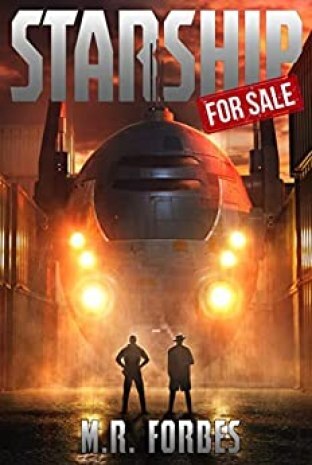 I really enjoyed this book. I was a big fan of M.R. Forbes’ Mindfracked so I was intrigued when I saw he’d also done a space opera. Isekai stories where heroes enter fantasy worlds are pretty common but the science fiction equivalent where a young man is taken into outer space is less so. GUARDIANS OF THE GALAXY is the most famous example but it’s still pretty rare.
I really enjoyed this book. I was a big fan of M.R. Forbes’ Mindfracked so I was intrigued when I saw he’d also done a space opera. Isekai stories where heroes enter fantasy worlds are pretty common but the science fiction equivalent where a young man is taken into outer space is less so. GUARDIANS OF THE GALAXY is the most famous example but it’s still pretty rare.
Much of the first half of the book is getting Ben to the point where he’s willing to take a chance on an offer as obviously insane as the one presented to him by Keep. Ben has to endure cancer, a chance encounter at a virtual reality video game arcade, and his friend revealing he’s inherited millions before he’s fully onboard. Even then, he only accepts after an appropriate amount of evidence that this insane situation is real. I appreciate M.R. Forbes taking the time to ease audiences into this despite the fact most of us would have been likely to accept events on the title alone.
Unfortunately, the galaxy turns out to be a not particularly nice place. I really liked M.R. Forbes justification for why it is filled with humans, though. Apparently, humans from the future went through a wormhole and ended up colonizing the galaxy in the past. It’s so ridiculous and absurd that I used something similar in my Star Trek Adventures game. I love when science fiction jiggles around the whole fossil record and evolutionary history of the planet.
The bigger problem than the galaxy being colonized by an insane and violent race of nutters (humans) is the fact it is also a feudalist future like Dune. There’s Empresses, Dukes, Duchesses, and Barons as well as all that other stuff we’ve since left behind. Unfortunately, that comes with an insane and evil warlord who wants the micro-star inside their newly acquired starship. Oh and it turns out that they owe some seriously expensive storage fees on their machine, ones they have no way of paying and the punishment is death for.
I enjoy the fact our protagonists are flat broke once they get into space. It turns out rather than being like Star Trek, poor Ben and Matt are going to be living more like Han Solo. Thankfully, they have the help of a shapechanging (?) alien who used to be an assassin. Yeah, I don’t think they signed up for the right space opera. I like that despite the silly premise, our heroes are rapidly confronted with the Firefly-esque realities of living in space. They even try to be pragmatic about things and offer to sell the Macguffin to the bad guy but, of course, he sees no reason to pay when he can just take.
There’s a lot of great world-building and characterization here. This is a setup story, mostly, and ends on a cliffhanger but I don’t think that’s a bad thing. It’s hard to sell me on a new series when there’s already so much good stuff out there but I am intrigued by the setup here and the characters. If I have one regret, it’s the fact that Ben doesn’t bring along the girl he asked on a date into space.
Indie Military Science Fiction and Space Opera books – Part 1
Check Out Starship for SaleThe post Review – STARSHIP FOR SALE by M.R. Forbes appeared first on BEFOREWEGOBLOG.



